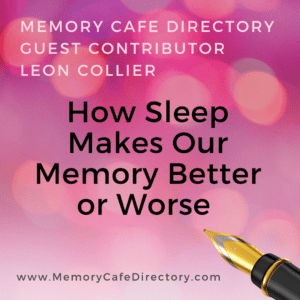Memory Cafe Directory posts and/or links to retailers can be advertising, sponsored, or affiliate links. We may earn a small commission from them. Thank you.
How Sleep Makes Our Memory Better or Worse
Submitted by Guest Contributor Leon Collier
For over 100 years, researchers and scientists have sought to understand the relationship between sleep and memory. They all agree through different studies that memory consolidation – which is the process of keeping vital memories and discarding information that is deemed unnecessary – happens during the NREM (non-rapid eye movement) and REM (rapid eye movement) stages of the sleep cycle.
Some studies reveal that excessive or insufficient sleep can affect the brain’s cognitive processes, including memory processing. So, not only does resting well at night promote good physical conditions, but it also enables the brain to function well. That’s why it is essential that you get the amount of sleep that is recommended per night to help consolidate your memories.
How Sleep and Memory are Connected
There’s a complex relationship between sleep and memory. When you get enough rest, your brain will process newer information after you wake up. Also, taking a nap after learning something helps you consolidate the further details into memory, allowing you to store the information in the brain.
According to a college paper writer, there are four stages of the sleep cycle for a healthy adult. The first and second stages are called light NREM sleep. The third stage is known as the deep NREM or slow-wave sleep. These first three stages prepare the brain so that it can take in new information the next day. So, when adults fail to sleep or don’t get enough sleep, it can reduce their ability to learn by almost 40%.
The NREM stage of the sleep cycle is where the brain sorts through the different memories and activities from the last day. It filters out the crucial memories and also eliminates other information that it finds unnecessary or irrelevant. The selected memories will be more concrete at the start of the NREM sleep, and the process continues through to the REM sleep. At the REM stage, emotional memories are processed, which helps you handle difficult experiences.
Most of the time, dreams happen in REM sleep, as the brain’s thalamus transmits information from the five senses to your cerebral cortex. This thin cerebrum layer processes and interprets information from the memories. Although the thalamus does little or nothing during the NREM sleep, as soon as the REM stage begins, it relays sounds, images, and other sensations to your cerebral cortex, and this information is integrated into your dream.
In other words, if you are seeing dreams, then your rest is probably going well. If your rest is so short that you don’t get to the point when you see dreams, then you probably will experience a sleep deprivation effect.
How Sleep Deprivation Affects Memory and Brain Functions
Sleep deprivation has its adverse effects, and people that fail to get enough sleep are likely to experience these effects. For example, one of the most common symptoms of sleep deprivation is difficulty remembering things. This is because the brain doesn’t have the time to build new pathways (which happens during sleep) for recently learned information.
So, many memories are lost. This is how sleep deprivation affects the consolidation of memories. Other cognitive impacts of sleep deprivation, such as inability to focus, difficulty in learning, poor behavioral and emotional control, poor decision-making skills, etc.
Sleep deprivation is associated with poor academic performance. A student who constantly sacrifices not only hours of sleep but full nights will perform badly in his studies.
If a student goes without sleep the night before the test he will perform significantly worse than his well-rested classmates. That is because during the night rest our brain transmits short term memories into long term memory. Meaning that most of the information you study may be lost if you do not consolidate it by a good sleep.
Another area of possibly bad consequences for a sleep deprived-person would be driving. Even though many people deem driving as a passive task it is not so from the point of view of our brain activity. Driving is a very complex skill demanding a high level of attention. That is why a sleep-deprived driver is often compared to a drunk driver. These states are very similar in terms of attention level and decision making and are very dangerous for anyone.
The amount of sleep that a person needs per night depends mainly on their age. Apart from adults, a study concluded that children also experience solid memory consolidation after they enjoy a good night’s rest.
However, it also has to be said that excessive sleep is detrimental as well, as it can also cause cognitive impairments. Therefore, everyone must strive to get the recommended amount of sleep per night because too much or too little will lead to several negative repercussions.
One study also found that the quality of sleep decreases as humans get older. The reason for this is linked to slow-wave sleep. The medial prefrontal cortex is the part of the brain where slow waves are created, and it deteriorates with time. This is why older people tend to not experience as much slow-wave sleep as the younger ones during the sleep cycle. So it will be more difficult for their brains to process memories.
Relationship Between Memory Loss and Sleep Apnea
We have established the importance of sleep to the process of creating and consolidating memories. So, it is not surprising that many sleep disorders are linked with memory problems.
For example, Insomnia – which is the persistent difficulty initiating or maintaining sleep – causes daytime cognitive impairments such as reduced memory functions. Sleep disorders, such as narcolepsy, that cause uncontrollable daytime sleepiness can also cause memory loss.
Sleep apnea is another sleep disorder that is the temporary absence of air during sleep and causes people to gasp for air or choke. Excessive daytime sleepiness and heavy snoring are common symptoms of this disorder.
One study published by a dissertation service explored the connection between depression and obstructive sleep apnea (OSA) concerning memory processing. The struggle concluded that people with OSA had more difficulty forming semantic memories and individual facts about them or their personal history.
The fact that the brain needs healthy sleep to consolidate semantic memories means that the result of the finding isn’t surprising. OSA leads to sleep fragmentation which interrupts the sleep cycle. However, the good thing is that OSA didn’t affect the brain’s processor consolidating episodic memories and memories that relate to experiences and events.
The interference to the sleep cycle caused by sleep apnea makes it difficult for people with this condition to recall some of their lives’ memories.
Conclusion
Getting good sleep regularly and maintaining a healthy sleep pattern are vital to developing solid memories. However, not getting enough sleep or having a poor sleep pattern doesn’t help your memory. So, you must try to maintain the recommended hours of sleep for your age. Although there might be a need to deprive yourself of sleep to meet up with deadlines, you should know that sleep helps you to focus more and be more efficient.
Since sleep deprivation – or excessive sleeping – is so detrimental to our mental abilities it becomes a really serious question. If the quality of our decisions relies on the quality of our sleep the night before should we not strive to make it as good as possible? In other words, we take responsibility for our mistakes tomorrow when we decide whether to go to bed at the proper time today.
Another important question would be the quality of sleep among the doctors, teachers, policemen and other people whose decisions are very important for society overall.
Leon Collier

Leon Collier
Leon Collier is a blogger and academic writer from the UK who works with essayontime and provides college paper reviews at online assignment help.
He likes trying new subjects and is always focused on proving his worth as a writer in new and challenging writing areas. His hobbies are reading books and playing tabletop games with his friends.
When he’s not busy writing, he loves reading books and playing tabletop games with his friends.
Follow him on Twitter @LeonCollier12.
Become a Contributor!
 Do you want to be a Memory Cafe Directory contributor? If you have helpful information to share with our community, read about the guidelines, then get in touch to discuss what you have to offer.
Do you want to be a Memory Cafe Directory contributor? If you have helpful information to share with our community, read about the guidelines, then get in touch to discuss what you have to offer.
Thank you.






